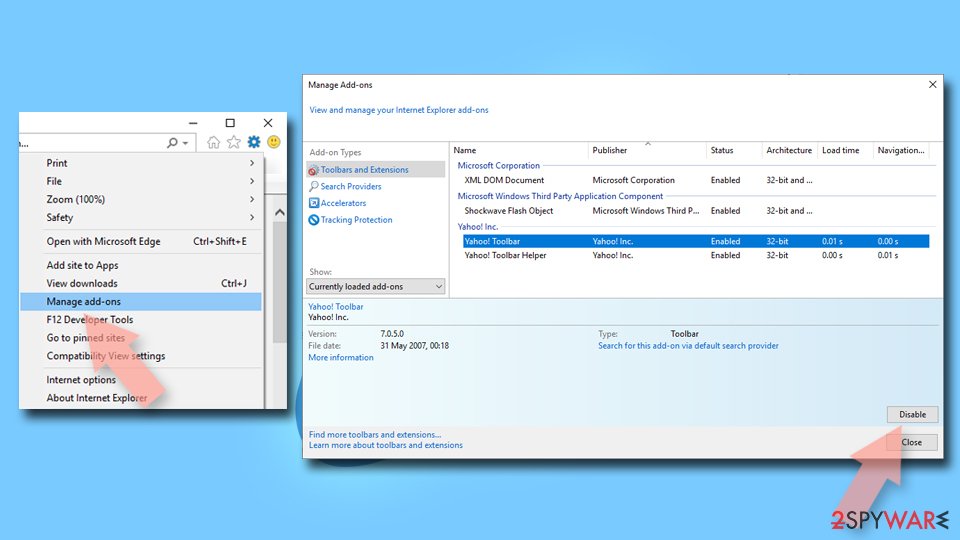Wish-card.in ads (virus) - Free Guide
Wish-card.in ads Removal Guide
What is Wish-card.in ads?
Wish-card.in is a website that supposedly offers digital gift cards on mother's day

Wish-card.in is a shady website that claims to be able to send a mother's day card. In reality, this site causes ads to appear and asks users for personal information which can result in monetary losses or installations of PUPs (potentially unwanted programs)[1] and malware.
The website targets countries that speak the Hindi language, like India and Pakistan. It is unclear what is the exact purpose of this site but it was definitely created to monetize user activity. If you see such websites quite often, you should check your system for adware or malicious browser extensions.
| NAME | Wish-card.in |
| TYPE | Online scam; adware |
| SYMPTOMS | A spammy website appears supposedly offering to send your mother a “thank you” card |
| DISTRIBUTION | Shady websites, deceptive ads, freeware installations |
| DANGERS | The website may ask users to fill out their personal information which could lead to the installation of PUPs, malware, and monetary losses |
| ELIMINATION | Scan your system with anti-malware tools |
| FURTHER STEPS | Use FortectIntego to fix any remaining damage and optimize the machine |
Distribution of Wish-card.in
It is not common to find such pages in the search results. Usually, they appear when users are browsing through already shady sites that are full of deceptive ads and sneaky redirects. Most of the time these are sites that engage in illegal activities because they are unregulated. That includes illegal streaming platforms and torrent sites.
That is why it is so important to be careful while surfing the web. Do not click on random links and make sure the website you are using is safe. Fraudsters have come up with clever social engineering tactics to fool users into performing various tasks just to get something in return.

Another reason why you may see Wish-card.in is adware. It is a type of PUP that hides in the background of your system and generates commercial content. You may experience pop-ups, banners, and unexpected redirects. Adware generates revenue for it developers by using pay-per-click advertising. Every time you click on an ad placed by adware, they get a cut.
Remove suspicious extensions
Removing add-ons is possible only the manual way, so you will have to go to your browser settings. We have provided instructions for the most frequently used browsers. Keep in mind that this removal method might not work because a potentially unwanted program might be affecting your computer. Go to the settings, and remove the plugins one by one to see if you notice any changes:
Google Chrome
- Open Google Chrome, click on the Menu (three vertical dots at the top-right corner) and select More tools > Extensions.
- In the newly opened window, you will see all the installed extensions. Uninstall all the suspicious plugins that might be related to the unwanted program by clicking Remove.
![Remove extensions from Chrome Remove extensions from Chrome]()
MS Edge:
- Select Menu (three horizontal dots at the top-right of the browser window) and pick Extensions.
- From the list, pick the extension and click on the Gear icon.
- Click on Uninstall at the bottom.
![Remove extensions from Edge Remove extensions from Edge]()
MS Edge (Chromium)
- Open Edge and click select Settings > Extensions.
- Delete unwanted extensions by clicking Remove.
![Remove extensions from Chromium Edge Remove extensions from Chromium Edge]()
Mozilla Firefox
- Open Mozilla Firefox browser and click on the Menu (three horizontal lines at the top-right of the window).
- Select Add-ons.
- In here, select unwanted plugin and click Remove.
![Remove extensions from Firefox Remove extensions from Firefox]()
Safari
- Click Safari > Preferences…
- In the new window, pick Extensions.
- Select the unwanted extension and select Uninstall.
![Remove extensions from Safari Remove extensions from Safari]()
Internet Explorer:
- Open Internet Explorer, click on the Gear icon (IE menu) on the top-right corner of the browser
- Pick Manage Add-ons.
- You will see a Manage Add-ons window. Here, look for suspicious plugins. Click on these entries and select Disable.
![Remove add-ons from Internet Explorer Remove add-ons from Internet Explorer]()
Bundled software dangers
One way you could have gotten in this trouble is by downloading a potentially unwanted program. Most of the time users do this unintentionally by not paying attention during the installation process. These programs come bundled together with software from unofficial sources.
Freeware distribution sites are the main channels for spreading PUPs. They include additional programs in the installers and do not disclose this on their pages. Users do not notice them because they rush through the process and get too excited to try the new program.
You should always be attentive during this process and choose the “Custom” or “Advanced” installation method. Do not skip through the steps; read the Terms of Use, the Privacy Policy, and uncheck the boxes next to the files that are not needed. The best option is always using official developer websites or web stores to install software.
Identifying which program is responsible for causing unwanted symptoms in your browser might be hard if you have never done it before. The program could be disguised as a handy program that you would not suspect – an antivirus, system optimizer, or video converter. If you are not sure, we recommend using SpyHunter 5Combo Cleaner or Malwarebytes anti-malware tools that will scan your machine, eliminate it, and prevent such infections in the future.
Manual removal often results in failure because users uninstall only the program but cannot remove entries from the registry or hidden files. This can result in the renewal of the infection. If you still want to do this yourself, here are the steps for Windows and Mac systems:
Windows 10/8:
- Enter Control Panel into Windows search box and hit Enter or click on the search result.
- Under Programs, select Uninstall a program.
![Uninstall from Windows 1 Uninstall from Windows 1]()
- From the list, find the entry of the suspicious program.
- Right-click on the application and select Uninstall.
- If User Account Control shows up, click Yes.
- Wait till uninstallation process is complete and click OK.
![Uninstall from Windows 2 Uninstall from Windows 2]()
Windows 7/XP:
- Click on Windows Start > Control Panel located on the right pane (if you are Windows XP user, click on Add/Remove Programs).
- In Control Panel, select Programs > Uninstall a program.
![Uninstall from Windows 7/XP Uninstall from Windows 7/XP]()
- Pick the unwanted application by clicking on it once.
- At the top, click Uninstall/Change.
- In the confirmation prompt, pick Yes.
- Click OK once the removal process is finished.
Mac:
- From the menu bar, select Go > Applications.
- In the Applications folder, look for all related entries.
- Click on the app and drag it to Trash (or right-click and pick Move to Trash)
![Uninstall from Mac 1 Uninstall from Mac 1]()
To fully remove an unwanted app, you need to access Application Support, LaunchAgents, and LaunchDaemons folders and delete relevant files:
- Select Go > Go to Folder.
- Enter /Library/Application Support and click Go or press Enter.
- In the Application Support folder, look for any dubious entries and then delete them.
- Now enter /Library/LaunchAgents and /Library/LaunchDaemons folders the same way and terminate all the related .plist files.
![Uninstall from Mac 2 Uninstall from Mac 2]()
Clear your browsers
After encountering a website like Wish-card.in you should take care of your browsers. It might still be collecting data about you with the help of cookies.[2] they are small data files that are stored on your device, so you can delete them at any time. They may contain information like your IP address, browser version, websites you visit, links you click on, and things you purchase online.
Cookies are not inherently a bad thing. They can help websites and web-based apps personalize the user experience. But more often than not, they are used to make a profit by selling them to advertising networks[3] or other third parties. There have also been instances where cookies got hijacked and used for malicious purposes so it is a good idea to clean them regularly.
You can choose to use a maintenance tool FortectIntego that can perform a scan automatically for you. Besides cleaning all the junk and improving the performance of your device it can fix various system errors, corrupted files, and registry issues which is especially helpful after a virus infection.
How to prevent from getting adware
Choose a proper web browser and improve your safety with a VPN tool
Online spying has got momentum in recent years and people are getting more and more interested in how to protect their privacy online. One of the basic means to add a layer of security – choose the most private and secure web browser. Although web browsers can't grant full privacy protection and security, some of them are much better at sandboxing, HTTPS upgrading, active content blocking, tracking blocking, phishing protection, and similar privacy-oriented features. However, if you want true anonymity, we suggest you employ a powerful Private Internet Access VPN – it can encrypt all the traffic that comes and goes out of your computer, preventing tracking completely.
Lost your files? Use data recovery software
While some files located on any computer are replaceable or useless, others can be extremely valuable. Family photos, work documents, school projects – these are types of files that we don't want to lose. Unfortunately, there are many ways how unexpected data loss can occur: power cuts, Blue Screen of Death errors, hardware failures, crypto-malware attack, or even accidental deletion.
To ensure that all the files remain intact, you should prepare regular data backups. You can choose cloud-based or physical copies you could restore from later in case of a disaster. If your backups were lost as well or you never bothered to prepare any, Data Recovery Pro can be your only hope to retrieve your invaluable files.
- ^ Chris Hoffman. PUPs Explained: What is a “Potentially Unwanted Program”?. HowToGeek. Tech News.
- ^ What are Cookies?. Kaspersky. Home Security.
- ^ What is an advertising network?. BigCommerce. Ecommerce Marketing and Strategy.











